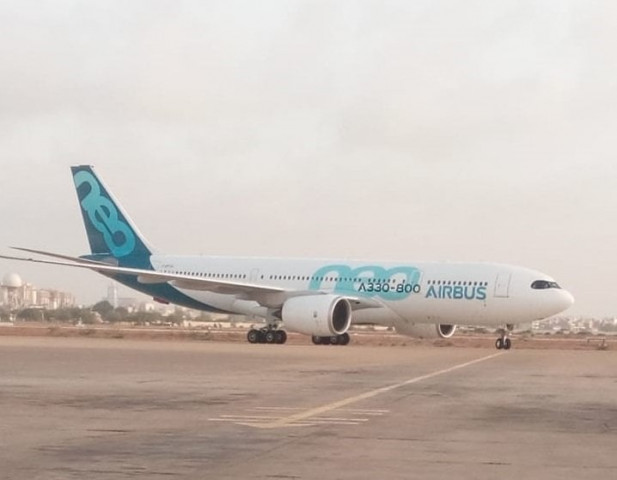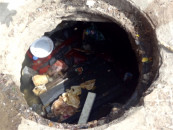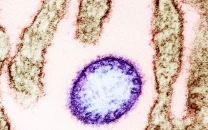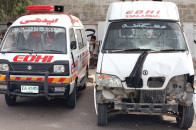Airbus experts visit crash site as ATC blames pilot error
French experts extend stay in Karachi; global pilots association offers assistance in probe

Airbus experts visit crash site as ATC blames pilot error
An A320 of the Pakistan International Airlines (PIA) crashed in the Model Colony neighbourhood of Karachi, while approaching for landing at Quaid-e-Azam International Airport on May 22. Eighty-nine passengers and eight crew members on board died in the crash while two passengers survived miraculously.
The Pakistan government immediately notified a four-member investigating team, headed by Air Commodore Usman Ghani. The France-based Airbus company also announced its own inquiry into the crash and sent a team of experts to Karachi on Tuesday.
The French experts immediately started their investigation after reaching the terminal on a special flight from Toulouse. They underwent the coronavirus precautionary measures in place at the airport and were all cleared to proceed.
Later, the team visited the Civil Aviation Authority (CAA) headquarters where they were given a detailed briefing on the ongoing investigation by the Aircraft Accident and Investigation Board’s (AAIB) four-member investigation team.
During the briefing, the investigators were briefed on the black box and voice data recorder recovered from the crash site. According to sources, the devices would be handed over to the Airbus team for decoding.
After decoding of the data recorder, the investigators would be able to hear the conversation between the captain and first officer during the entire flight and the conversation with air traffic controllers from different areas.
The decoding of the black box would also help determine how the two captains used the plane’s equipment from take-off till the crash and assess how well the cockpit crew adhered to Airbus’ agreed procedures for operating the aircraft.
After midday, the team visited the crash site in Model Colony amid tight security. The AAIB investigators and the relevant officials of the CAA and the PIA were also present on the spot. The CAA Fire Department and PIA Flight Safety and Engineering officials briefed the team on the aftermath of the crash.
Sources said that the team inspected the aircraft’s engines, landing gear, wings and flight control system avionics. They also inspected the houses destroyed in the crash. “The foreign investigators took pictures and videos of the wreckage and the affected buildings,” a source said.
Later, the team returned to the airport to inspect the 3,600-metre runway. They inspected marks of friction on the runway due to belly landing, reviewed CCTV footage of the landing and surveyed the runway and apron from different angles from the control tower and approach tower.
According to the sources, the French experts sought complete record of the crashed aircraft from the PIA, to know how many times did the A320 land in a year, what defects were worked on, how many cycles did the engine complete during the flight last year, how many times did the plane go through the check process, how many times the landing gear was serviced, which engineers worked in the main technical services of the aircraft, what resources and parts were used to fix the technical issues etc.
The sources said that the foreign investigation team also inquired whether there was any malfunction in the alarm system of the aircraft, adding that the investigators obtained a one-year record of the crashed plane.
Pilot error
Initially, the French team was scheduled to depart on Tuesday night, however, the investigators had their stay in Pakistan for three days. The plane, which took them to Karachi was later allowed to return to Toulouse, the sources said.
The French team arrived as the AAIB team continued its own investigation into the crash. The sources said that the air traffic controller and approach tower controller who were on duty at the time of air crash submitted their written replies to the inquiry committee.
According to the sources, the approach tower controller handled the flight from Lahore to Karachi and assigned the task of landing the aircraft to the ATC after 10 nautical miles away from landing. They informed the inquiry board about the final moments of the flight.
According to the response given by the ATC controller to the investigation team, the sources said, the captain ignored instructions 10 nautical miles from the landing. Before landing at Karachi airport, the planes fly at 1,800 feet high, but the captain was flying ill-fate plane at an altitude of 3,000 feet.
Despite repeated instructions, the captain said that he would manage the altitude and speed before landing. They told the investigators that in his first attempt, the captain came to land the aircraft without opening the landing gear.
When the captain made the first landing, both engines hit and scratched against the runway three times, they said, adding that the captain was busy maintaining the speed and the altitude of the landing, therefore he forgot to open the landing gear.
Landing the aircraft without landing gear created sparks when the engine hits the runway. The captain flew the plane again and asked for permission to land, the controllers said, adding that at the time of second landing the captain said the engines had stopped working.
According to the sources, the ATC told the investigators that the plane was allowed to land on Runway No 25 Left for. The investigation team asked the ATC if the captain had given any indication of an emergency landing, the ATC said that the captain said that they are calm and will land and did not declare emergency.
IFALPA offers assistance
Meanwhile, the International Federation of Airline Pilots Associations (IFALPA) has offered its assistance to the Pakistani authorities in the plane crash probe, requesting them to include its representative as consultant in their investigation team.
In a letter to Air Commodore Usman Ghani, the head of the Pakistani investigation team, IFALPA President Captain Jack Netskar said the IFALPA experts had been part of several inquiries in the air accidents in the past.
The letter, copies of which had also been sent to the regional director of the International Civil Aviation Organization (ICAO) and other related international bodies, also stated that in the light of the investigation, recommendations would be made to make the air travel safer in the future.



















COMMENTS
Comments are moderated and generally will be posted if they are on-topic and not abusive.
For more information, please see our Comments FAQ